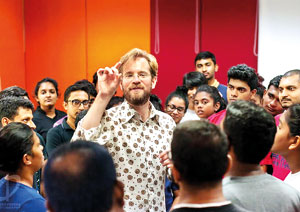Applause for young Shakespearean actors

Shakespeare for today: Chris White with the Workshop Players. Pic by Andre Perera
Though he is an Associate for the Royal Shakespeare Company, Chris White had never actually judged a school Shakespeare competition before he came to Sri Lanka. He admits the thought itself made him a little uncomfortable, the idea of young people being forced in to boxes of winners and losers, the risk of the pleasure of theatre being swamped underneath a tide of competition. Those are still concerns, but what he found in Sri Lanka also impressed him.
“I don’t think they are blowing their trumpets as much as they should,” White told the Sunday Times. “You just have to consider how many young people have benefitted from this programme.” Over four decades of annual events with very few gap years in between has meant that the Inter-School Shakespeare Drama Competition has engaged many thousands of young people. White thinks even a country like the UK would struggle to match this without government funds and strong institutional support. “I don’t know of any other event quite like this.”
Part of the reason he feels this way is the actors themselves. “I saw the absolute commitment and intensity they brought to this process and that was true of every single piece.” Hearing that students would stay late at school, sometimes rehearsing till midnight, he understood how special that experience must be for all the performers. “That just wouldn’t happen in the UK,” he says, adding that the competition itself was in many ways “just joyous.”
White is a roving freelance director specialising in international collaborations and new writing. His work has taken him around the UK and as far afield as China and now Sri Lanka, where he came at the behest of the British Council. One result of these varied experiences has been his faith in translations – one of the first things we talk about is his eagerness to see Shakespeare made accessible through high quality Sinhala and Tamil versions of the plays. “Some of the best productions of Shakespeare I have seen have been in languages other than English,” he says citing Japan as one example.
Shakespeare’s celebrated use of language, from the made-up words to the clever puns, do offer any translator a daunting task. In China, White heard of versions that relied on a classical, archaic form of the language, which often proved indecipherable to audiences, offering a valuable lesson in how not to translate the Bard. “Of course, it’s not easy, and you need somebody amazing, but I think it would be a tragedy if Shakespeare remained confined to a purely English tradition –you would be cutting off people simply because of the circumstances of their birth.”
White brings a similar openness to adapting Shakespeare’s plays. He has worked with children and with 80-year-olds to reinvent the works of the Elizabethan playwright for modern venues as varied as the classroom and the stage. As a director he feels “context is everything,” and much about a production is determined by who is involved and who will see it. His own personal response to the text, as well as the politics and social conflicts of the time might also inform a reinvention. But, it is always a challenge. If Shakespeare is an oddity to audiences outside the UK, he is increasingly equally so inside the UK itself. Shakespeare wrote often about God, royal dynasties and paranormal occurrences, subjects that many people no longer feel invested in, the director points out.
“Many people don’t actually believe in God, kings or magic anymore, but that doesn’t mean they aren’t interested in the nature of belief, the problems of hierarchies or the struggle between faith and doubt,” says White. “In some ways, Shakespeare can be quite foreign to some UK audiences.” White enjoys how a Shakespearean production can be a surprisingly flexible and supple kind of form, the scripts so layered, and potent, almost so active in a sense, that staging them is often a transformative experience.

Chris White at the Shakespeare Comp
He shared some of these experiences with actors from the Workshop Players at a one-day session held at the British Council in Colombo. His emphasis there was on how to make the texts breathe in more contemporary, relaxed productions that, for instance, allowed actors to exchange lines in a more natural cadence. He also talked about just having fun.
White is part of a group of people lobbying for a change in how these plays are taught in UK schools. He believes someone’s first encounter, if pleasurable, expectation free and relaxed, might actually allow them to perform better in exams later. For him personally, introducing young people to the Bard has often been a pleasure.Studying Shakespeare can offer an amazing introduction to the most essential aspects of our shared humanity – all that grappling with primal emotions and sudden bursts of insight. Says White: “He can give you an intimation of what is coming in life.”


